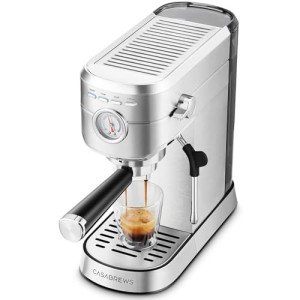The Rise of Home Espresso Machines: A Comprehensive Guide
As coffee lovers continue to look for fresh and delicious brews in your home, the popularity of home espresso machines has actually surged in the last few years. No longer simply the domain of cafes and cafe, these machines empower people to craft barista-quality espresso beverages from the convenience of their kitchens. This short article will explore the numerous types of home espresso machines, their features, and factors to consider for picking the ideal one. Additionally, it will provide a selection of FAQs to assist prospective buyers make informed decisions.
Kinds Of Home Espresso Machines
Home espresso machines can be categorized into a number of categories based on their mechanisms and user-friendliness. Each type has its special features, pros, and cons.
| Type | Description | Pros | Cons |
|---|---|---|---|
| Manual Espresso Machines | Requires the user to by hand control the brewing process, involving strategies like pulling a lever to develop pressure. | - Complete control over developing procedure - Compact design | - Requires skill and practice - Time-consuming |
| Semi-Automatic Machines | Machine automates water flow and pressure, but the user still controls the dosing and period of the brewing procedure. | - Balance of automation and control - Versatile | - Learning curve for perfecting methods |
| Completely Automatic Machines | Automates the entire developing procedure, from grinding to brewing, often with programmable settings for personalized drinks. | - Extremely easy to use - Quick and practical | - Less control over the brewing process - Higher cost point |
| Capsule or Pod Machines | Uses pre-packaged espresso capsules or pods to create coffee rapidly and easily. | - Extremely simple to use - Minimal clean-up | - Limited taste range - More costly per cup than ground coffee |
| Super-Automatic Machines | Combines functions of totally automatic machines with built-in grinders, enabling users to brew entire bean espresso and milk-based drinks with one touch. | - All-in-one convenience - Ideal for milk-based beverages | - Often the most pricey - Can be large |
Features to Consider
When picking a home espresso machine, potential buyers need to think about the following features to ensure they select a machine that fulfills their requirements:
Grinder Type:
- Built-in grinders can provide fresher premises but may need more maintenance.
- Different mills permit more modification of grind size.
Pressure:
- Look for machines that produce a minimum of 9 bars of pressure, which is optimum for developing espresso.
Water Temperature Control:
- Machines with adjustable temperature settings permit better extraction of taste from beans.
Milk Frothing Options:
- Consider whether you want a manual steam wand for frothing or an automatic milk frother for convenience.
Relieve of Cleaning:
- Machines with removable parts and self-cleaning functions considerably minimize clean-up time.
Size and Design:
- Ensure the machine fits easily in your kitchen area and lines up with your aesthetic choices.
Budget:
- Set a budget before beginning your search, as rates can range significantly from affordable models to high-end machines.
Advantages of Home Espresso Machines
Owning a home espresso machine uses numerous advantages:
- Cost-Effective: Over time, developing espresso at home can save coffee enthusiasts money compared to frequent café gos to.
- Modification: Users can try out different beans, grind sizes, and brewing strategies to discover their perfect cup.
- Convenience: The capability to brew espresso whenever removes the need to head out to a coffee shop, especially beneficial during late nights or mornings.
- Quality assurance: With a home machine, individuals have complete control over the quality of ingredients and brewing processes.
Disadvantages of Home Espresso Machines
Nevertheless, there are some drawbacks to think about:
- Initial Investment: High-quality espresso machines can be pricey, needing a significant upfront investment.
- Knowing Curve: Mastering the art of espresso developing can take some time and practice, which may be daunting for newbies.
- Upkeep: Like any home appliance, espresso machines require routine cleaning and maintenance to make sure optimal efficiency.
FAQs
1. What is the very best type of home espresso machine for beginners?
Response: For beginners, a semi-automatic machine is often advised as it uses a balance in between control and automation, enabling you to discover the basics without frustrating complexity.
2. Just how much should I invest on a home espresso machine?
Answer: Entry-level machines can begin around ₤ 100 to ₤ 300, while higher-end designs can vary from ₤ 500 to over ₤ 2000. It's necessary to set a budget based upon your anticipated use and wanted features.
3. Do I need a separate grinder?
Response: While some espresso machines come with built-in mills, buying a different grinder enables greater customization and ensures better quality grounds.
4. How often should I clean my espresso machine?
Answer: Cleaning frequency can differ by machine type, but it's normally advised to clean the machine after each use and perform deep cleansings weekly or month-to-month, depending upon use.
5. Can I make milk-based drinks with any espresso machine?
Response: Not all machines include milk frothing capabilities. If you take pleasure in drinks like lattes or cappuccinos, try to find a machine with a steam wand or automatic frother.
Home espresso machines are transforming the method coffee enthusiasts enjoy their cherished brews. With different types and advanced features available in the market, there is something for everyone. Whether Pump Espresso Machines 's the joy of developing distinct recipes or merely savoring the ideal shot of espresso, buying a home espresso machine can enhance both the coffee-drinking experience and the quality of life for coffee fans all over. Similar to any investment, it is essential to weigh the benefits against the possible disadvantages and pick a machine that seamlessly fits both your lifestyle and preferences.

